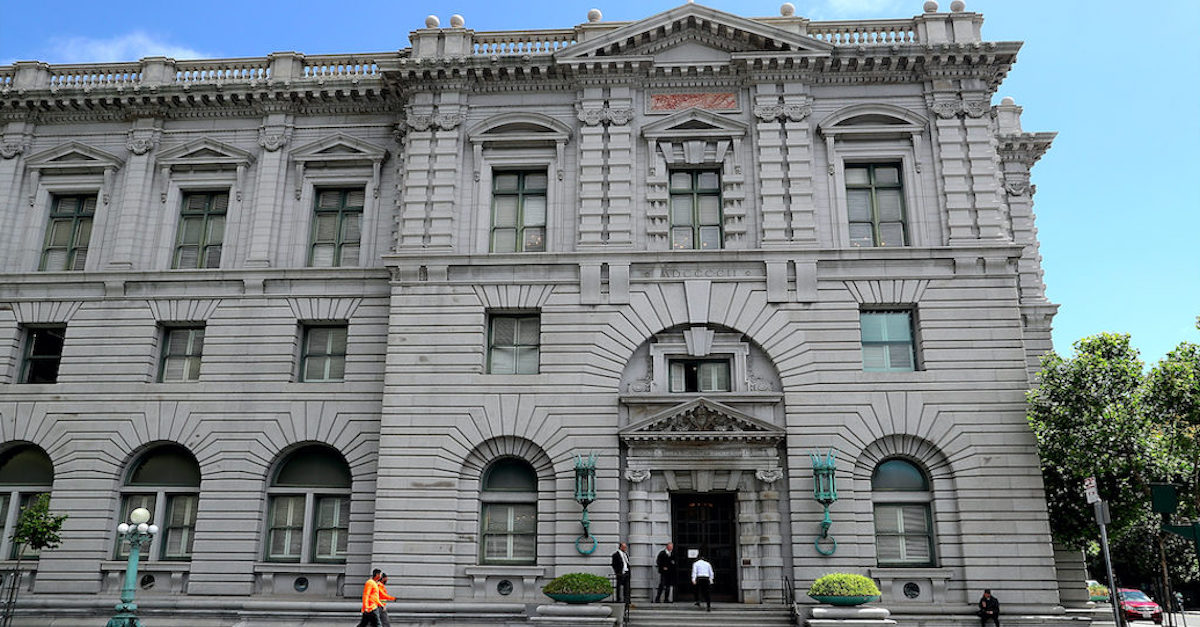
The U.S. Court of Appeals for the Ninth Circuit
The U.S. Court of Appeals for the Ninth Circuit sided with a California seminary on Monday, ruling that it is entitled to ignore federal anti-discrimination law and expel students in same-sex marriages.
Graduate students Nathan Brittsan and Joanna Maxon claim they were expelled from Fuller Theological Seminary in Pasadena, on the basis that they engaged in “homosexual forms of explicit sexual conduct.” Although the students had been enrolled for some time, their expulsion came after school administrators found out that they were in same-sex marriages.
Brittsan and Maxon sued the seminary, claiming that Fuller Theological Seminary accepts federal funding and is therefore bound by Title IX’s anti-discrimination mandate. In turn, the school argued that it is entitled to a defense based on what is known as the “religious exemption” under 20 U.S.C. § 1681(a)(3). The religious exemption specifically shields schools from federal anti-discrimination requirements by expressly stating that Title IX’s sex discrimination prohibition “shall not apply to an educational institution which is controlled by a religious organization if the application of this subsection would not be consistent with the religious tenets of such organization.”
The plaintiffs argued in court documents that the religious exemption does not apply to Fuller because the school operates independently, and not under the umbrella of any external organization. The district court disagreed, dismissing the case on the grounds that Fuller is, indeed, entitled to exercise the religious exemption as a defense.
The Ninth Circuit again sided with Fuller, holding in a brief and unpublished eight-page opinion that the ordinary meaning of the word “organization” used in the statute does not require that the school be affiliated with an external organization. Even if the statutory language could be construed in multiple ways, ruled the panel, there has been a longstanding interpretation of the word “organization” to encompass institutions like Fuller, that is control by their own boards of trustees.
The judges who heard the case were Senior U.S. Circuit Judge Richard Paez, a Bill Clinton appointee, and U.S. Circuit Judges Paul Watford and Michelle Friedland, both Barack Obama appointees.
The panel was clear in its ruling that Fuller appropriately relied on the religious exemption as a defense to the plaintiffs’ lawsuit, foreclosing any chance that the case might proceed with an amended complaint. The judges wrote:
While the district court did not discuss its reasons for denying Plaintiffs leave to amend, it was “readily apparent” from the record that they could allege no additional facts to save their challenge to Fuller’s differential treatment of same-sex marriages as compared to opposite-sex marriages, since Fuller’s actions fell squarely within Title IX’s religious exemption.
A footnote also called claims of harsher treatment “nothing more than conclusory”:
Plaintiffs also argue that Fuller treated them more harshly because they violated the Sexual Standards policy by being in same-sex marriages as compared to students who violated the Sexual Standards policy by engaging in other forms of prohibited sexual conduct. We need not decide whether that could be a cognizable theory of liability that might fall outside the religious exemption in the absence of a religious tenet Fuller holds that explains the differential treatment. Plaintiffs have advanced nothing more than conclusory assertions that Fuller engages in this sort of differential treatment, and they have conceded that they cannot currently advance any more-specific allegations even if given leave to amend. Plaintiffs’ factual allegations therefore do not present us with such a liability theory.
Although the case against Fuller appeared to be a straightforward win within the confines of standard religious freedom jurisprudence, the debate over the relationship between schools and religious freedom continues to come before federal courts.
Just weeks ago, the Ninth Circuit heard an appeal over whether a California Catholic school is entitled to use the “ministerial exception” to avoid federal prohibitions against racial discrimination. In early December, the Supreme Court of the United States heard oral arguments over whether Maine residents should be permitted to use state-funded tuition assistance at religious schools. These cases are proceeding against the backdrop of a landmark 2020 SCOTUS decision holding that parochial schools are entitled to use the “ministerial exception” to fire disabled teachers in contravention of federal anti-discrimination law.
Daniel Blomberg, senior counsel at Becket, the advocacy group that argued on behalf of Fuller Theological Seminar, provided the following quote to Law&Crime Tuesday in response to the circuit court’s ruling:
The Supreme Court has a long history of protecting the right of religious groups to make their own decisions in how to educate the next leaders of the faith. The Ninth Circuit recognized both this commonsense right and the Seminary’s vital role in forming Christian leaders – a role that should be taught in accordance with the mission of the Seminary’s beliefs and not coerced by the government. The court’s decision is one that underscores the American pluralistic value of religious freedom for all faiths, which allows people and communities of every background to pursue their religious missions without compromising their beliefs.
Attorneys for the plaintiffs did not immediately respond to request for comment.
Editor’s Note: This piece was updated from its original version to include comment from counsel.
[image via Justin Sullivan/Getty Images]